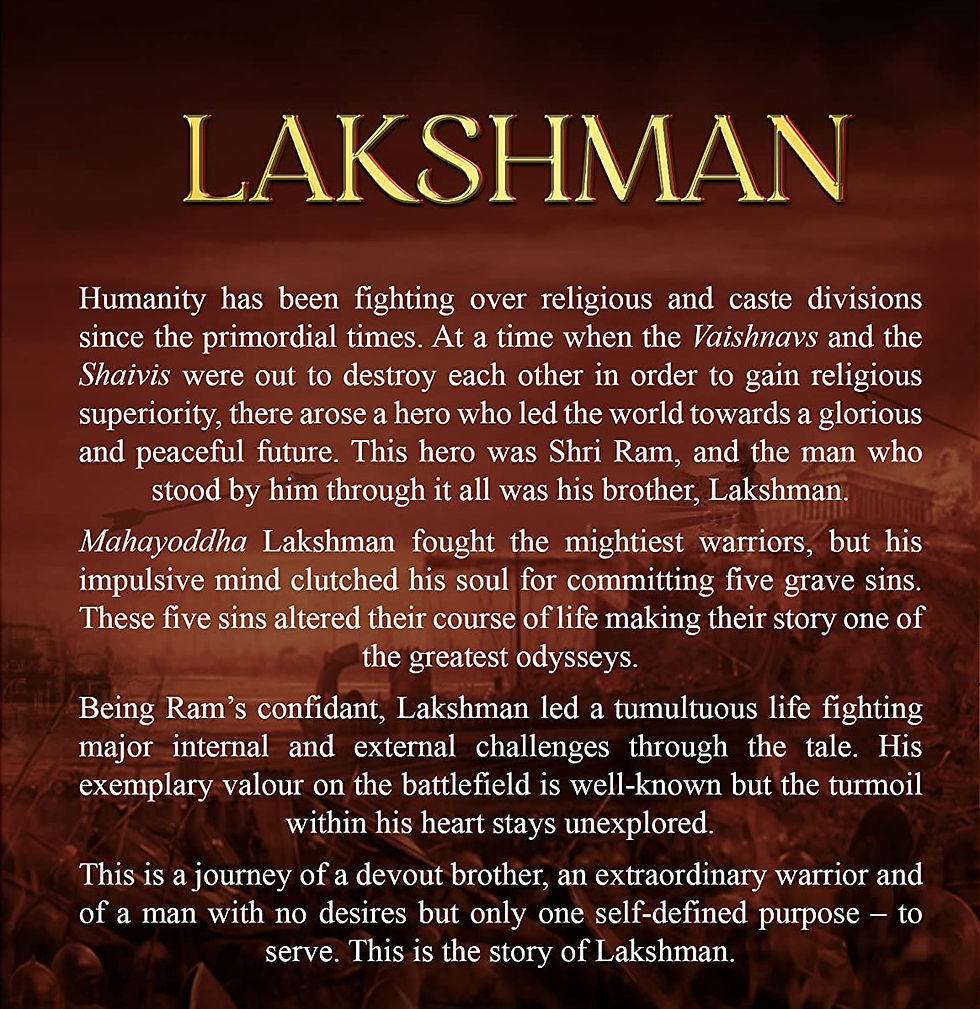Reading The Kindle Version Felt Like Beta Reading an Early Manuscript
- Dr. Abhinav Atul
- Oct 16, 2022
- 3 min read

The goods and the bads of the book aside, I was quite surprised to see footnotes in the book. Evidently put by the editor, these footnotes should not have been present in the published version of the book, period. That and the occasional typos made it feel like I was beta reading a manuscript and not a published novel; not to mention ‘honour’ and ‘honourable’ words were used in the first three-quarters of the book while in the last quarter these were spelt without the ‘u’.

This is a retelling of Ramayana from the perspective of Lakhsman, the younger brother of Ram.
As far as mythological fictions go, there are no surprises in the storyline. The author mentions in his note that this interpretation of Ramayana does not feature divine or magical abilities. I would say the author stood somewhere in the middle of the scope of mythological fiction and science fiction. Describing yajnas as research was quite smart, but it is one thing to mention the word ‘research’ and entirely different to make it interesting and plausible in the parameters of the storyline. I was expecting a clever and imaginative explanation of how yajnas worked, how they produced exploding arrows and such…but, no such luck.
The narration is mostly descriptive, with very few dialogues. Somehow that makes it feel like the events are taking place at a distance. Even when the narrator, Lakshman, is in the middle of the action, there is hardly a moment of intensity in this novel. And it doesn’t help that so many of the encounters Ram and Lakshman had with Raakshasas ended very suddenly, making this novel a series of anticlimactic episodes.
The entire story of Ramayana is indeed too lengthy and complex to narrate in a three hundred page novel. This novel took on this mammoth task and succeeded in mentioning or summarizing the major events in Ramayana from beginning till the end. In that context, however, I did not find anything unique or amazing in the story, except that the supernatural elements were omitted or modified in a way without anything intriguing or interesting to fill this gap in the narrative.
Even so, the greatest missed opportunity of closing the book on a high note that the author missed was the epilogue – or lack thereof. The premise of the prologue was a question: whether Lakshman would be granted one thing or the other. Lakshman narrated his story to justify that choice. An epilogue that actually showed what the final choice made was would have been a nice conclusion.
The novel did very little to make the reading experience immersive in any way.
It may not be fair but it is natural to compare this book with other mythological fiction works out there. One point that I wish to make here is in comparing Lakshman with The Immortals of Meluha. The groundbreaking bestseller by Amish Tripathi took the road of de-myth-ifying the story of Shiva. There was a connect with the characters and a level of intensity in the battle that kept the reader engaged. I hope author Kapil Sanghavi keeps in mind this aspect: a captivating story is not a narration of events, but a medium to make a reader forget the world outside the pages for some time.
I would give recommending this book a pass.

Book Link: https://amzn.to/3MDIRcA









Comments